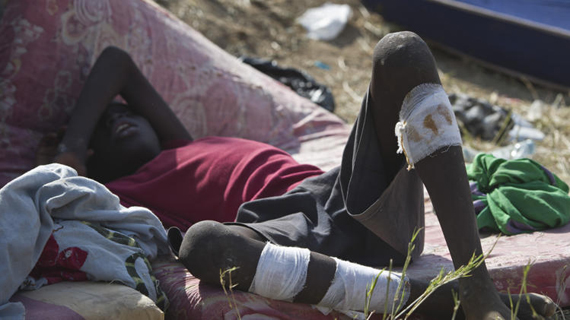
United Nations, Dec 22: The bravery of 43 Indian peacekeepers stationed at a UN base in South Sudan, which was attacked by about 2,000 rebels this week, prevented more casualties, a top UN official said as she lauded the dedication shown by Indian troops in peacekeeping missions.
Two Indian soldiers Warrant Officers Dharmesh Sangwan and Kumar Pal Singh were killed in the December 19 attack on the UN base in the Jonglei state town of Akobo in South Sudan.
A third soldier Indian Battalion Warrant Officer Mondal Shabul was wounded in the chest during the attack and was flown to Malakal where he was?reported to be in stable condition.
The UN Mission in South Sudan (UNMISS) held a memorial ceremony in Juba yesterday for the two Indian Battalion peacekeepers killed in the attack.
Special Representative of the UN Secretary-General (SRSG) for South Sudan Hilde Johnson paid tribute to Sangwan and Singh as "brave and courageous soldiers"?and extended her condolences to the families and loved ones of the fallen peacekeepers.
"As a mission, we are inspired by the dedication shown by the Indian troops," said Johnson, who laid wreaths on the coffins of the slain peacekeepers during the ceremony which was held at the Mission's compound adjacent to Juba International Airport.
"Had it not been for their bravery, the death toll at the (UNMISS base) could have been higher."
Johnson cited the press statement of the Security Council which condemned the attack in the strongest terms and called on the Government of South Sudan to swiftly investigate the incident.
She also emphasised the resolve of the peacekeeping mission to carry out its mandate to support South Sudan and help protect its people.
"This horrendous act...Will not stop us from carrying out our work," she said.
"To anyone who wants to threaten us, attack us or put obstacles in our way, our message remains loud and clear: we will not be intimidated."
South Sudan's Minister of Foreign Affairs and International Cooperation Barnaba Marial Benjamin reaffirmed his government's commitment to fully investigate the incident and bring the perpetrators to justice.
"The people of South Sudan deeply regret the irresponsible and cowardly act that has led to the loss of life of these great soldiers," Benjamin said.





Comments
Add new comment